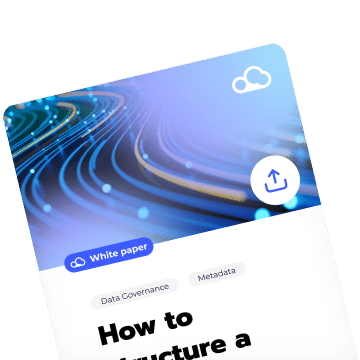Managing corporate data is a complex challenge, but securing and controlling data access for each company’s employees is necessary. Both data governance and data management are incredibly vital to the company, but how do they depend on each other?
Data management & data governance: Two roles for a common goal
Data management and data governance are both essential to the smooth functioning of a company. Data management keeps track of how your data is used, while data governance ensures that all employees will respect its importance to the business. Data management and governance work to secure your organization’s valuable data resources.
What is data management?
Data management describes all the principles, practices, programs, and processes a company must have to operationalize its valuable data, from its creation to deletion. Thanks to the evolution of sourcing and storage technologies, databases can now accumulate huge amounts of data. Of course, data security regulations must also be a central concern.
Making the right data accessible to the right people while respecting efficiency and compliance constraints is necessary. The value of data does not change from a business point of view: data management is only focused on the operational and technical parts. The administration of databases is often handled by the company’s IT department (Data Engineers, Data Architects, or Data Lake Managers).
Ultimately, data management is a way for companies to use nearly all their data, taking care of its storage and processing. The most important aspects of data management are Data Quality and Data Security. A company’s management must be able to rely on recommendations from IT to foster optimal use of the company’s critical information.
What is data governance?
Data governance is a sub-discipline of data management. The Data Governance Institute defines data governance as a practical and actionable framework that helps various data stakeholders across any organization identify and meet their information needs. Data governance is the set of norms and processes that value and regulate all the resources linked to the company’s data (data sources, databases, Excel files, etc.)
Data governance is used to determine and analyze:
- Useful, useless, or obsolete data
- The accessibility of data by the different users
- The use of data
Closer to the business and its needs, data governance brings a more strategic level of thinking than data management. The objective is to facilitate decision-making at different company levels using data. All the players in the company can then innovate, find the information that will advance their projects, accelerate the go-to-market…and outperform the competition.
Data governance is an analytical framework that brings a more structured, process-based approach to two key functions: decision-making and collaboration. It’s designed to be proactive and forward-thinking, with decision-makers creating plans based on use case scenarios. Providing generic and standardized evaluation methods can encompass both structured and unstructured data across the company. As such, it doesn’t only address data management; it also touches on other sub-disciplines in Information Technology, such as database design or programming best practices.
The company’s strategic decision-makers apply the Data Governance policy: Chief Data Officers, Business Unit Directors…
Data governance: An indispensable element for data management
Manage data simply
A proper data governance policy can check for code errors in database access. The principle is to restrict access so that only those concerned with a specific piece of data can access it.
Governance is also useful for protecting company data: you can also see which data is the most reliable and useful for your employees. Then you can focus the management system on the most used data to ensure greater efficiency in integration, storage, etc.
Data governance allows you to verify regulatory compliance of business processes but also gives you direction for technical data management operations. All processes are simplified, saving time and efficiency for all teams in the enterprise!
Data management & data governance: At the heart of the action
Your organization’s data governance policy should not be decided by management alone. The theory and conceptualization of governance may not be adapted to the realities of the field. The operational staff will not always have access to the right information, or the data will be unusable in practice…
Take the time to prepare the implementation of data governance: you can, for example, start with a small perimeter. This will help you better understand the needs of the business and technical teams, which will help you convince them to adopt the data governance policy. Then, expand your scope without losing sight of the collaborative approach.
Data management is becoming increasingly important to organizations. The amount of data being collected is becoming so large that it’s simply impossible.
Conclusion
When it comes to data management vs. data governance, you can’t have one without the other. Data management and data governance are both essential to the smooth functioning of a company. Data management keeps track of how your data is used, while data governance ensures that all employees will respect its importance to the business. Together, they work to secure your organization’s valuable data resources.
An effective data strategy can greatly help your company, allowing you to get more value out of the data you collect and store. By thinking strategically and considering the long-term needs of your business, you can put in place policies and practices that will help you keep your data safe, maintain its integrity and relevance, reduce errors, and avoid security breaches that could compromise your reputation—or result in major financial loss for your company.
—
Discover the benefits of creating an intuitive data catalog to fit your needs! Sign up for a demo of DataGalaxy’s Data Knowledge Catalog, an all-in-one tool that offers out-of-the-box actionability with fully customizable attributes, powerful visualization tools, standardized business glossaries, and AI integration to help organizations easily document, link, and track all their metadata assets on one dynamic platform.





